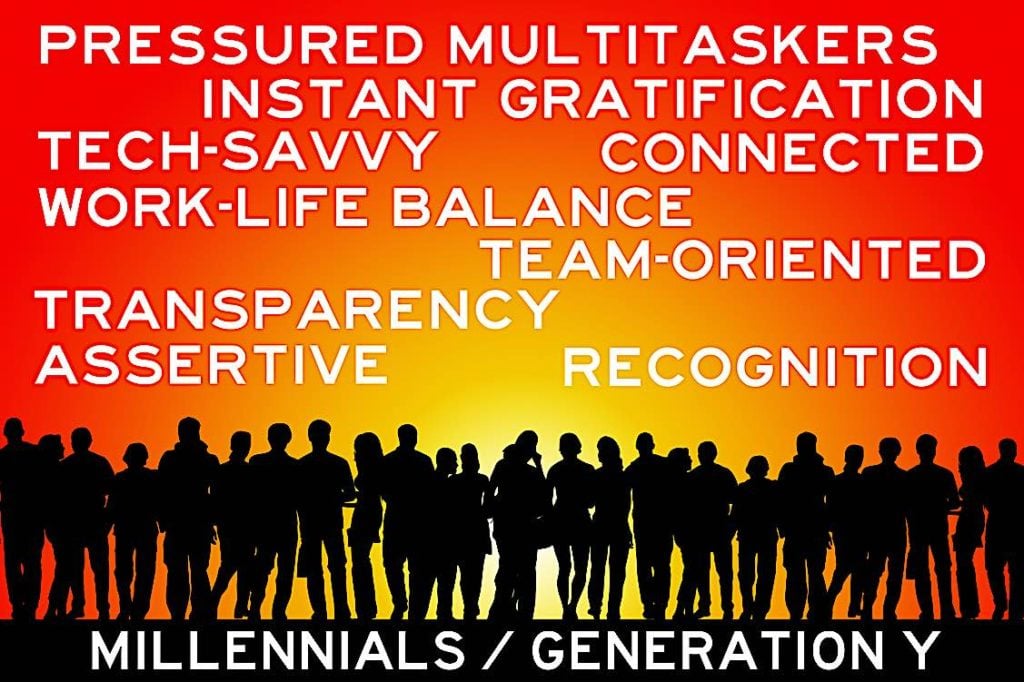
HR Managers: Millennials by the numbers — what you need to know about “the new face of the workplace.”
Millennials are the face of the future workplace, according to PEW Research. Known as “confident, self-expressive, liberal, upbeat and open to change,” your HR planning inevitably will include a sizable cohort of Millennial team members.
Millennials have already flexed their demographic muscle, influencing the decline of non-tech industries and the rise of Uber and non-traditional media. What do you really know about Millennials? Here are some “did you know?”s:
- 75% of Millennials have social media profiles
- 20% of Millennials have a tattoo? (And half of those have two to five tattoos)
- Millennials are “on track to become the most educated generation in American history”[1]
- 25% have a body piercing

Interestingly, in the Pew survey, the main defining characteristic of Millennials (“What makes your generation unique?”) was “technology use,” while for Baby Boomers the cited response was “work ethic.”
Retain, Retain, Retain?
The mantra of HR Management is, or should be:
Retain
Retain
Retain
Recruiting new talent is a costly and uncertain venture — and it’s one reason companies outsource HR Management and recruiting. It is a better investment of time and money for your HR Management team to focus first on retention. With that in mind, if you do need to recruit, it helps to know what candidates are looking for in 2018 — especially given that these same considerations can help you hold on to your valued and productive team.
Chances are, if you are an HR Manager today, you’ll be heavily focused on Millennials — one of the largest cohorts of available human resources.
Millennials are important to your future
 Let’s put it this way: millennials have changed entire industries just by their behaviours and demands. Millennials, aged 18-37, are the main reason entire industries are dwindling:
Let’s put it this way: millennials have changed entire industries just by their behaviours and demands. Millennials, aged 18-37, are the main reason entire industries are dwindling:
- Taxis
- Telecom landline
- Post office
- Mainstream media, such as newspapers and news channels
- Television networks
They are the massive surge that drives social media and new media. Not only do they help reshape the labour force distribution, but they also dominate your choices for new team members.
Note: This is meant to be informational only for Human Resources Managers only — and not meant to encourage age discrimination. These are massive cohorts, and no analysis of a large segment can be considered criteria for qualification. We’re discussing general management concepts only — i.e. the cost of replacing mature human resources, and relative value of retaining if possible.
By the demographic numbers
 First consideration in retention, by the numbers, is demographics. If you understand what motivates your team, you will have a higher retention rate. Chances are good, based on Pew Research, that your team consists of a wide mix of demographics, dominated by Boomers — close to retirement — and a large number of Gen X-ers, with a few Xennials thrown in the mix. If you are forced to — or are considering — replacing these well-trained and mature assets, chances are you’ll be recruiting mostly from the current dominant demographic on the labour market:
First consideration in retention, by the numbers, is demographics. If you understand what motivates your team, you will have a higher retention rate. Chances are good, based on Pew Research, that your team consists of a wide mix of demographics, dominated by Boomers — close to retirement — and a large number of Gen X-ers, with a few Xennials thrown in the mix. If you are forced to — or are considering — replacing these well-trained and mature assets, chances are you’ll be recruiting mostly from the current dominant demographic on the labour market:
- Millennials or Gen Y: born between 1981 and 2000, aged 18-37 in 2018
How you view Millenials; opinions vary — some flattering, some not-so-complimentary, including the “me” generation, the “spoiled” cohort, or the “entitled” Ys. Pew Research indicates they dominate the prospective labour force, and currently they represent 27.5% of the population.
In other words, the departing team member is likely born between 1946 and 1980, with the requisite experience of years on the job. The incoming team-member is likely 18-37 years old, with less experience — but hopefully lots of energy and enthusiasm.
Confused by the demographic terms?
 Here are the demographics by the numbers — just as important to HR Managers as they are to marketers seeking to sell to consumers:
Here are the demographics by the numbers — just as important to HR Managers as they are to marketers seeking to sell to consumers:
- Great Generation: born 1901-1926 (age 92+ in 2018): not normally in consideration for HR
- Silent Generation: born 1927-1945 (aged 73-91 in 2018): likely retired, with some exceptions
- Baby Boomers: born 1946 – 1964 (aged 54-72 in 2018): your most experienced team-members — about 23.4% of population
- Gen X: born 1965-1980 (aged 38-53 in 2018): depending on industry, one of your largest cohorts of team-members — 20.8% of population
- Gen Y or Millenial born 1981 and 2000 (aged 18-37 in 2018): the main incoming segment of recruits with 27.5% of the population
- Gen Y, Post-Millennials, IGEN born 1995-2008 (aged 1-17): not yet in contention for most jobs.
Ignore demographics at your peril: Millennial snapshot
Millennials have the highest rates of unemployment and underemployment.
 The State of the American Workplace Report from Gallup (2017) is the source of the above statement, which indicates there are also significant reasons to recruit from the Millennial cohort.
The State of the American Workplace Report from Gallup (2017) is the source of the above statement, which indicates there are also significant reasons to recruit from the Millennial cohort.
All of the aspects of “retain, retain, retain” that are apparent advantages — for example, the costs of training new team members — can also be reasons to consider shaking up the team with Millennial talent. They are intelligent and are more readily available.
What do we know about Millennials? Again, bearing in mind these are general observations of demographers — not our opinion, nor a reflection of individual qualifications — these are the observed traits of Millennials, according to PEW research:
- 83% of Millennials sleep with their cell phone (versus 50% of Boomers and 68% of Gen Xers)
- 24% of Millennials define their “technology use” as their unique characteristics (versus Boomers who cite “Work Ethic”); Millennials are the only cohort who does NOT cite “Work Ethic.”
- 2% of Millennial males are military veterans, versus 6% of Gen Xers and 13% of Baby Boomers (U.S.)
- 1 in 8 Millennials has “boomeranged” to the parent nest due to finances (moved back home with the parents).
Managing Millenials
As you recruit in younger team members, keep in mind their individual talents and qualifications, but also remember to take advantage of the positive skills and attitudes of Millennials:
- abundance of confidence
- eagerness honed by a recession
- optimistic and upbeat
- malleable and open to change
- technologically adept.
Of course, like all “categorizations” there are wide variances.
Do you have a question about HR Management, outsourcing HR, or Millennials? Use our handy contact form:p
Contact Pivotal
NOTES
[1] Pew Research Center “Millennials: Confident. Connected. Open to Change.”


 Our HR solutions experts can recommend the right mix of HR outsourced services to make your entry into Canada easier.
Our HR solutions experts can recommend the right mix of HR outsourced services to make your entry into Canada easier.  Pivotal Employment Management Services co-hires your workforce, simplifying entry of your business in Canada.
Pivotal Employment Management Services co-hires your workforce, simplifying entry of your business in Canada. 

















There's No Such Thing as a Company Without HR